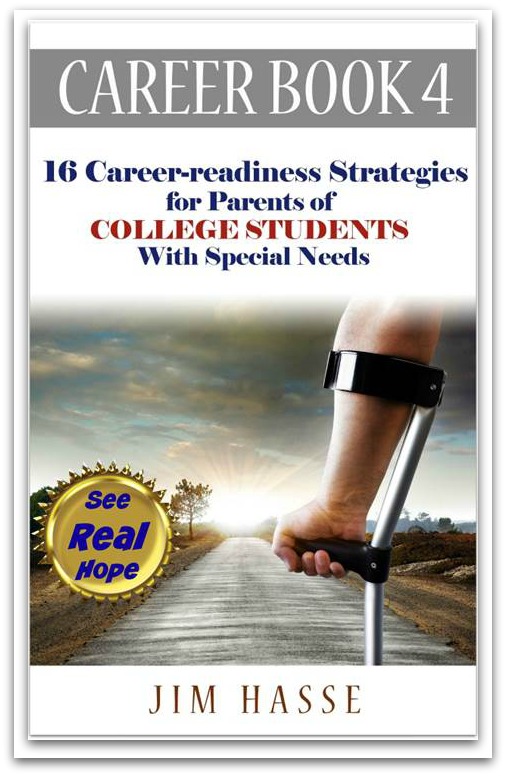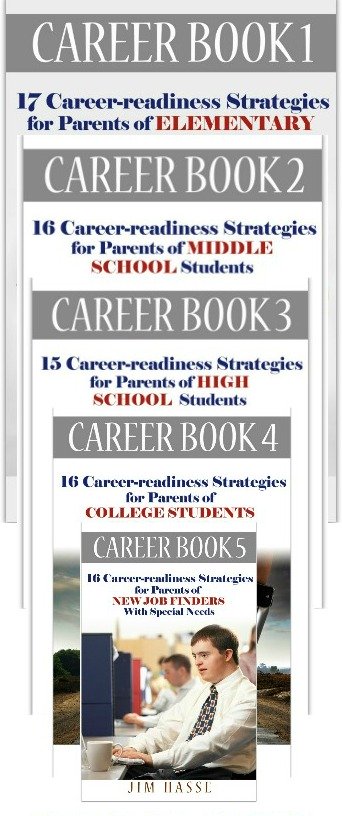Interview
Tips: Cerebral Palsy
Career Builders for College Students
By Jim Hasse, ABC, GCDF, Disability Employment Expert
_________________________________________________________
My interview tips summary: The key to feeling confident during a job interview is preparation -- one of my 20 career builders (see my 20 articles based on National Career Development Guidelines) for college students who happen to have cerebral palsy (CP).
After considering the road map those guidelines outline for your college student, I believe the most essential interview tips you can give your college student with CP are these: Know yourself, know how you react to various situations and prepare yourself so you can be at the top of your performance.
That’s not easy for us as mature adults let alone your youngster in college with CP who may be uneasy about how to handle upcoming job interviews.
Feeling confident in any job interview situation hinges on whether job candidates have personally addressed their strengths and challenges and whether they have discovered how and where they do their best work, according to Sybil Pressprich, Senior Counselor, Adult Career & Special Student Services, University of Wisconsin-Madison.
“Get feedback from others and pay attention to yourself and your reactions to various situations,” recommends Pressprich, who organizes practice interview situations and provides interview tips for her clients.
Pressprich says college students must decide what they want to get across to their interviewers during the first 15 minutes of the discussion. They need to think like an employer. They need to ask themselves:“Who am I? What does the employer expect?”
And, your college student with CP also needs to prepare for a behavioral interview, which is much more probing than traditional interviewing. Under a behavioral interview, employers predetermine which skills are necessary for the open job and then ask very pointed questions to determine if the job seeker possesses those skills.
For example, if successful customer care is essential for a position, then your youngster may be asked about applicable experience in customer service and personal views about how to achieve superior customer service.
So, in other words, Pressprich explains, the key to your college student with CP feeling confident during the next on-campus job interview is preparation (the "first page" of her portfolio of interview tips).
However, displaying confidence during a job interview is often difficult,
especially if your youngster has disability issues to address.
But, don’t despair
if, at first, you don’t see that confidence in your youngster. Pressprich
points out that 98 percent of job seekers experience self-doubt and even some
symptoms of depression at some time during a job search (especially when it
involves a transition from a college environment to a work setting).
The good news is you can help your college student to alleviate that stress and depression and build self-confidence by collecting (and passing on) interview tips you believe to be essential to his or her success in finding a job.
Confidence builders
Consider these confidence-building interview tips that Pressprich offered to career counselors during the 12th Annual Summer Institute on Education and Work at the University of Wisconsin-Madison in July 2011. She recommends that you encourage your youngster to:
- Focus on past experiences and
personal strengths.
- Take classes and workshops to
improve interpersonal skills.
- Take small steps in moving
forward to reach goals.
- Challenge the negative thought, “I’ve had so many interviews and no job offer; what is wrong with me?” Replace it with affirmative thoughts.
I found Pressprich’s suggested tactics for focusing on personal strengths particularly helpful. She recommends “The Interview Rehearsal Book: Seven Steps to Job-winning Interviews Using Acting Skills You Never Knew You Had” by Deb Gottesman and Buzz Mauro (Berkley Pub Group, 1999).
Gottesman and Mauro recommend that college students keep a journal and complete two of these sentences each day leading up to their job interviews:
- “One of the nicest
compliments I have ever received is …”
- “People can always depend on
me to …”
- “My most important
achievement so far this year is …”
- “I really helped someone when
I ...”
- “My greatest personal
strength is …”
- “I know a lot about …”
- “My co-workers appreciate me
for my …”
- “A good decision I recently
made is …”
- “One thing I really like
about myself is …”
- “Most people are surprised to hear that I …”
As a person with CP, I spend a lot of time (much more than the average
person) in the bathroom each morning getting dressed etc. I use that “extra time”
to capture my affirmative thoughts about myself on a daily basis and keep them
on Post It notes on my mirror. Many of them are essentially interview tips.
Your youngster can do the same and review all of those affirmative notes the day before a job interview.
He or she can also identify positive personal attributes by following this exercise from the interview tips I found in the Gottesman and Mauro book.
Complete the sentence, “I am …,” creating a list of adjectives (which may already be in your resume) to describe yourself. Select the top five attributes you believe to be most noteworthy.
Then, for each attribute, the co-authors recommend writing a specific example from your work or personal life about when you exhibited that trait.
What are the three attributes which could prove to be most useful in the job for which you are interviewing? Write about how each of these three attributes would be helpful for your future employer. Also review those the day before your interview.
By following these simple exercises, Pressprich says, job seekers are controlling what’s real, managing their stress levels and detailing their attributes. They’re preparing themselves to present what they want to get across to their prospective employers during those first 15 critical minutes of their job interviews.
How critical are those first 15 minutes? According to the Society for Human Resource Management, 63 percent of job interviewers generally know 15 minutes into a job interview whether they’ll make a “not-to-hire” decision on a particular job candidate.
So, those 15 minutes of a job interview are critical. That’s one of the most important job interview tips I can pass along to you as you career coach your college student with CP.
Stories need to be concrete, brief
Interviewing is a portal through which talent enters an organization, points
out Florence Haley, SPHR, IPMA-HR CP, Director of Human Resources, City of Beloit, WI.
“If you get to an interview,” she tells college students, “you know the
prospective employer believes you can do the job. The interviewers want to find
out if you’re the right fit for the organization and if you’re motivated to do
the job to the best of your ability.”
Employers believe past behavior predicts future behavior, says Haley, who also spoke at the 12th Annual Summer Institute. She advises that college students tell their interviewers what they want to know in concrete terms through brief stories about their accomplishments.
Those stories, according to Haley, should answer these questions that interviewers most likely have in the back of their minds:
- Are you willing to learn?
- Do you have good
communication skills?
- Do you know how to manage
stress?
- Are you resourceful?
- Do you take the initiative?
- Are you open to change?
It's best to give details but be brief and avoid generalities. “Cite the situation you faced, the action you took and the results (some kind of measurement) you generated,” Haley urges in her remarks to college students.
And, she always recommends avoiding statements such as, “This is my dream job,” “I think outside the box.” and “I’m results-oriented” -- which are generalities and have become clichés.
She also cringes when she hears, “I need a job” or “I just need a break,” which I also sometimes hear from job seekers with disabilities. Employers really don’t care because those considerations are irrelevant to the interview situation, which is designed to match what the job requires with what the job applicant offers, Haley asserts.
But, employers want job seekers to do a good job in the interview because they want to find the right person for the job, she says. “They don’t want to find themselves again interviewing to fill the same job in six months.”
So, use these interview tips to help your college student prepare, practice and relax before a job
interview. And, encourage him or her to “be yourself.”
What college students should be able to do
According to the National Career Development Guidelines (NCDG), these are the 11 career development competencies your youngster should be developing at the “implementation” level during college:
-
Valuing one’s personal
interests, likes, and dislikes as a step toward building and maintaining a
positive self-concept.
- Practicing respect for diversity as an essential positive
interpersonal skill.
- Anticipating growth and change as essential parts of
career development.
- Achieving a balance among personal, leisure,
community, learner, family and work roles.
- Acting on the premise that educational achievement and
performance levels are needed to reach personal and career goals.
- Committing to ongoing, lifetime learning as a means for enhancing
one’s ability to function well in a diverse and changing economy.
- Creating and managing a career plan for meeting career
goals.
- Making decisions within an overall personal strategy for managing a
career.
- Using accurate, current and
unbiased career information in
planning and managing one’s career.
- Accumulating consistently the
fundamental knowledge about the variety of skills that are important for success and advancement in
school and work, such as communicating, critical thinking, and problem
solving.
- Analyzing changes in employment trends, societal needs and economic conditions and the impact they have on one’s career path.
The content of my web site follows the NCDG framework for each of these five stages in your youngster’s development:
-
Elementary, when your
child becomes aware of job titles.
- Middle/junior high, when your
youngster begins to appreciate individual personalities and preferences
among family and friends through a simple career test.
- High school, when your
youngster needs to start gaining work experience through part-time jobs.
- College, when your
youngster needs to master specific job seeking skills, such as absorbing and
implementing interview tips.
- Job search, when your young son or daughter becomes a job finder by putting together job seeking skills into a comprehensive marketing campaign and career management approach that he or she can routinely update throughout a lifetime.
As your youngster progresses through each of these five developmental milestones, I’ll show you the barriers I personally encountered (and worked around) as a person with CP and the options you and your youngster can consider for your own “workarounds.” Many of those workarounds will likely turn out to be interview tips.
20 career builders for college students
Specifically, I have divided the 11 NCDG competencies for your college student into two sets of 10 disability-focused articles. One set is based on self-confidence, and the other set is focused on competitive advantage for your college student:
10 career builders which foster your youngster’s self-confidence. These include developing:
- Self concept (How to Find a Job, Leadership Style)
- Career mindedness (Personal Development Tools, EEOC)
- Decision making skills (College Courses, Learning Style Test)
- Career information gathering
abilities (Cornell University, Vocational Rehab)
- Career path management skills (Corporate Internships, Government Jobs)
10 career builders which provide opportunities to discover a personal competitive edge. These include developing:
-
Interpersonal communication
skills (Emotional Intelligence Test,
Communication Skills Test)
- Balance between work and
personal time (Career Counseling
Online, Legitimate Work
From Home)
- Educational and lifelong
learning orientations (LinkedIn,
Affirmative Action)
- Career trend tracking
abilities (Career Counselor,
Department of Labor)
- Job marketing skills (Social Network, Resume Writing)
In essence, each of these career builders are also interview tips because they ultimately will help your youngster develop into an individual who will stand out in job interviews and who will be a job candidate employers will want to hire.
Since 1997, I’ve met many accomplished people with CP who are successfully working within a wide variety of occupations. On this site, you’ll find their success stories (and how their parents and other mentors have helped them succeed by using some of the above interview tips to coach them).
Follow me, and you and your youngster with CP will also have the opportunity to share your views about specific mentoring issues as well as personal success stories with others facing some of your same challenges.
You'll have the opportunity to grow together within each of the above stages of discovery and learning.
Return from Interview Tips to Cerebral Palsy Career Builders.
This is Creative Commons content. You can freely and legally use, share and repurpose it for non-commercial purposes only, provided you attach this sentence and the following attribution to it (including the two links):
Originally written and illustrated by Jim Hasse, ABC, GCDF, owner of Hasse Communication Counseling, LLC, who, as a person with cerebral palsy, served for 10 years as a vice president in a Fortune 500 company during his 29-year career in corporate communication. He’s an Accredited Business Communicator, certified as a Global Career Development Facilitator and author of 14 Amazon books about disability awareness and disability employment issues.





